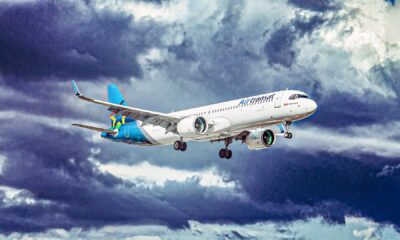World
Canadian Airlines Achieve Remarkable 0% Flight Cancellations in September

Two Canadian airlines, Air Transat and Flair Airlines, recorded an impressive 0% cancellation rate for flights in September 2023, a notable achievement in the highly competitive aviation industry. This milestone reflects the airlines’ commitment to operational reliability, a crucial factor for attracting and retaining business and premium leisure travelers.
On-time performance (OTP) and cancellation rates are key metrics that airlines monitor closely. Passengers, particularly those traveling for business, prioritize not just timely departures but also the assurance that their flights will not be canceled. Airlines strive to minimize disruptions, as operational reliability is essential for capturing high-yield segments of the market.
Understanding On-Time Performance and Its Importance
On-time performance is measured by the percentage of flights that arrive within a specified threshold, typically within 14 minutes of the scheduled time. Maintaining strong OTP is vital for several reasons. It helps protect flight connections, preserves aircraft turnaround times, and ensures that crew members remain within their duty limits. Conversely, poor OTP can lead to a chain reaction of delays and cancellations, negatively impacting the overall customer experience.
Flight delays can create significant inconveniences for travelers, especially when they result in missed connections or overnight layovers. For airlines, on-time performance also affects operational costs. Delays can incur additional expenses such as overtime compensation for staff, maintenance delays, and potential penalties associated with missed connections. Airlines that effectively manage their operational challenges tend to have a greater ability to maintain high OTP and low cancellation rates.
Significance of Cancellation Rates
Cancellation rates are critical indicators of an airline’s ability to deliver promised capacity. A canceled flight not only frustrates passengers but also disrupts travel plans, potentially stranding travelers and damaging trust in the airline. From a financial standpoint, cancellations can lead to lost revenue, increased refund obligations, and additional costs associated with accommodating affected passengers.
Operationally, cancellations can hinder crew rotations and misplace aircraft, creating ripple effects that affect future flights. For corporate clients, high cancellation rates can jeopardize contracts, while leisure customers may develop negative perceptions that harm brand loyalty. Regulatory authorities and investors closely monitor cancellation metrics, making them strategically significant for airlines aiming for sustainable growth.
In September 2023, both Air Transat and Flair Airlines stood out in the North American aviation landscape by achieving a 0% cancellation rate. According to data from OAG, Flair operated 2,226 flights with an OTP of 89.1%, while Air Transat completed 2,082 flights with an OTP of approximately 77%. Their performance is particularly remarkable compared to major U.S. carriers, with Delta Air Lines canceling 0.38% of flights, United Airlines at 0.44%, and American Airlines at 0.98%.
Despite operating under challenging conditions in Canada’s major cities, both airlines maintained their operational integrity through streamlined networks and fleet management.
Flair Airlines primarily utilizes the Boeing 737 family, while Air Transat operates a mixed fleet of Airbus A321LR and A330 aircraft. This streamlined fleet strategy allows for reduced maintenance complexity and better scheduling flexibility. Their conservative approach to scheduling, which includes longer aircraft turnaround times, provides essential recovery options during operational disruptions.
Both airlines also benefit from operating out of well-managed hub airports, facilitating efficient crew swaps and maintenance operations. Their smaller operational scale enables them to navigate challenges more effectively compared to larger carriers.
As the aviation industry continues to evolve, the performance of Air Transat and Flair Airlines serves as an important example of how operational excellence can lead to significant competitive advantages. Maintaining low cancellation rates and high OTP is crucial for long-term success in a market increasingly defined by operational complexities.
In contrast, other North American carriers like Delta Air Lines, United Airlines, and Southwest Airlines manage to maintain decent OTP and relatively low cancellation rates despite their larger operations. However, American Airlines operates a greater number of flights while facing higher cancellation rates.
Globally, mid-sized carriers tend to excel in on-time performance and reliability. Airlines such as Royal Jordanian and Oman Air have demonstrated commendable performance, while larger networks like Aeromexico also achieve impressive results despite their size.
In summary, while carriers like Delta Air Lines showcase strong operational capabilities, their complexity makes achieving perfect performance challenging. In contrast, the success of Air Transat and Flair Airlines in September 2023 highlights the potential for low-cost airlines with streamlined operations to excel in an increasingly competitive landscape.
-

 Politics4 weeks ago
Politics4 weeks agoSecwepemc First Nation Seeks Aboriginal Title Over Kamloops Area
-

 World5 months ago
World5 months agoScientists Unearth Ancient Antarctic Ice to Unlock Climate Secrets
-

 Entertainment5 months ago
Entertainment5 months agoTrump and McCormick to Announce $70 Billion Energy Investments
-

 Science5 months ago
Science5 months agoFour Astronauts Return to Earth After International Space Station Mission
-

 Lifestyle5 months ago
Lifestyle5 months agoTransLink Launches Food Truck Program to Boost Revenue in Vancouver
-

 Technology3 months ago
Technology3 months agoApple Notes Enhances Functionality with Markdown Support in macOS 26
-

 Lifestyle3 months ago
Lifestyle3 months agoManitoba’s Burger Champion Shines Again Amid Dining Innovations
-

 Top Stories2 months ago
Top Stories2 months agoUrgent Update: Fatal Crash on Highway 99 Claims Life of Pitt Meadows Man
-

 Politics4 months ago
Politics4 months agoUkrainian Tennis Star Elina Svitolina Faces Death Threats Online
-

 Sports5 months ago
Sports5 months agoSearch Underway for Missing Hunter Amid Hokkaido Bear Emergency
-

 Politics5 months ago
Politics5 months agoCarney Engages First Nations Leaders at Development Law Summit
-

 Technology5 months ago
Technology5 months agoFrosthaven Launches Early Access on July 31, 2025




















